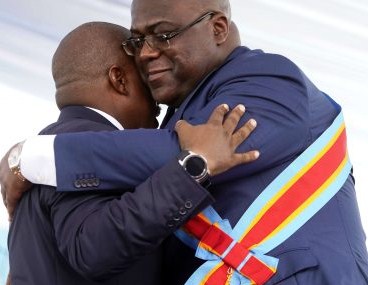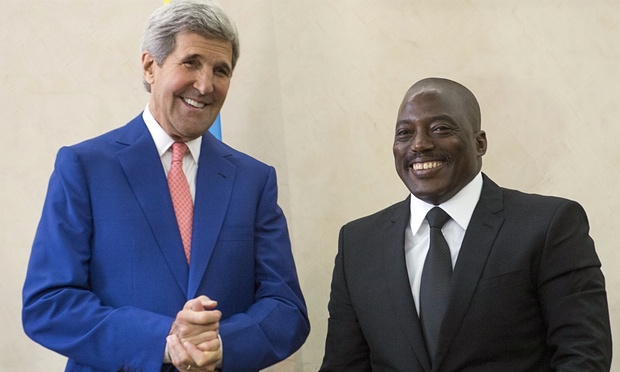Thsisekedi succeeds Kabila in DRC. How the U.S. weighed in

BY LOU SIFA
Felix Thsisekedi, 55, the son of the Democratic Republic of Congo’s historical opposition leader, Etienne Thsisekedi, today succeeded the country’s president of 18 years, Joseph Kabila, after an election marred by accusations of backroom deal with Kabila. As much as it was uncertain, until just a few days ago, that Felix Thsisekedi would be sworn in as president, so did it seem unlikely, barely a year ago, that Kabila would let the democratic process play itself out by not clinging to power. Pressure, including from the Obama administration, played a significant role to pave the way for this outcome.
Calls to recount the votes came from a number of neighboring African countries, including regional power Rwanda. Another opposition candidate, Fayulu, a former oil executive who claims he received 61% of the votes, accused Thsisekedi of plotting an “electoral coup” with Kabila. France and DRC’s former colonial master, Belgium, also questioned Thsisekedi’s victory, which outraged members of the African civil society such as Benin’s Bertin Koovi who called on all Africans to stop “ongoing efforts to steal Thsisekedi’s victory,” adding: “Whether France likes it or not, Felix Tshisekedi, the unquestionable winner of this election, will be sworn in as the president of the Democratic Republic of Congo.”
Even more powerful voices such as that of the continent’s second largest economy and continental power, South Africa, and the African Union, sided with the Democratic Republic of Congo’s electoral commission that declared Felix Thsisekedi the winner of the 30 December 2018 election.
The United States, which proved reluctant at first to recognize Thsisekedi as the winner, finally went along with the Pan-African organization.
State Department spokesperson Robert Palladino on Wednesday stated:
“The United States welcomes the Congolese Constitutional Court’s certification of Felix Tshisekedi as the next president of the Democratic Republic of the Congo. We are committed to working with the new DRC government. We encourage the government to include a broad representation of DRC’s political stakeholders and to address reports of electoral irregularities.”
Analysts interviewed for this article say regional powers such as South Africa, and the Pan-African organization, the African Union, preferred a peaceful succession to a prolonged electoral dispute likely to trigger violence. That choice sat well with the United States, as it transpired in the State Department’s remarks yesterday:
“The United States salutes the people of the Democratic Republic of the Congo for their insistence on a peaceful and democratic transfer of power.”
But the real U.S. efforts to ensure the rule of law and pave the way for a peaceful transition in the Congo came about during President Obama’s tenure.
The Obama administration is on record for trying to stop African heads of state who, by and large, are attempting to stay in power beyond the end of their constitutional mandate. During his meeting on May 4, 2014 with President Joseph Kabila of the Democratic Republic of Congo in Kinshasa, the capital, Secretary of State John Kerry pledged $30 million in support for transparent and credible elections, as the signs were pointing in the direction of President Kabila’s intention to delay the next presidential election scheduled in 2016, and, more importantly, his plan to illegally run for a third consecutive term.

In the press conference that followed the tête-à-tête, John Kerry said he had asked the president to step down at the end of his current mandate:
“It is important to the people to be able to know what the process is, to have confidence in that process.”
He added:
“The sooner the process is announced, the sooner that the date is set, the sooner people have an ability to be able to participate. And we believe it ought to be done in keeping with the constitutional process of the country.”
The above notwithstanding, not only did the Congolese information minister deny Kerry’s claim right after the latter’s departure, but also Kabila’s plan to run for a third term remained much alive until pressure, both from inside the Democratic Republic of Congo, including the Congolese Catholic church, from elseshere in Africa and the rest of the world, persuaded Kabila to wake up to the need to renounce his intention to cling to power.


